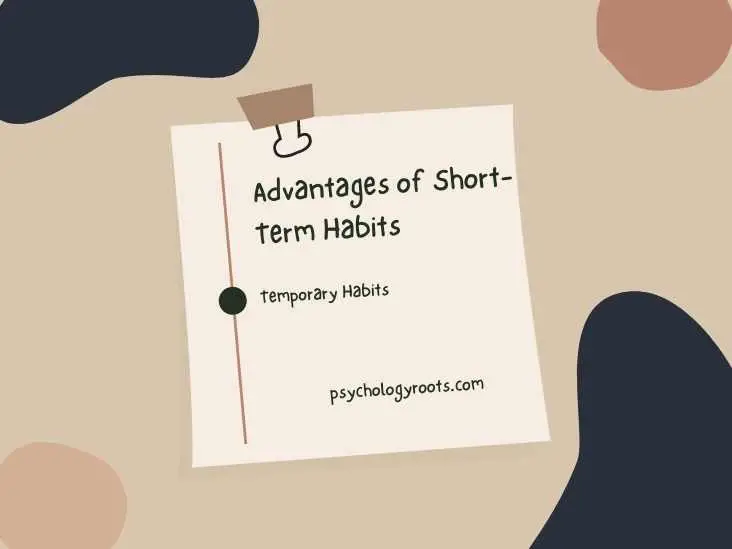Table of Contents
Advantages of Short-Term Habits
Here in this post, we are discussing and learning about “Advantages of Short-Term Habits”. You can read more about psychology-related material on our website. Keep visiting Psychology Roots.
When individuals conceive about habits, they often judge as unsuccessful any attempt to form a habit that cannot be maintained permanently. For instance, Ali will start running each day, but then he will quit. Jack could see it as a break in his usual routine.
When it comes to matters of public policy, one of the most common goals is for the general population to establish long-term patterns of behavior, such as reducing their water use or increasing their rate of recycling. On the other hand, in everyday life, even fleeting daily routines may have a great deal of significance.

Advantages of Short-Term Habits
Advantages of Short-Term Habits
Habits that are just temporary can:
Assist you in improving your productivity.
Let’s imagine you start cooking your lunch from scratch every day for a few weeks. A regular habit of doing so will help improve your efficiency in the long run. These time-saving tips may be used even if you stop following a regular routine. When you create your own hacks, you’ll be able to verify that they work for you, unlike those you’ve heard about. They aren’t just a ploy.
Make a list of your core values.
In order to determine if an activity is really in line with your beliefs, interests, and priorities, you need to engage in it every single day. Do you feel like you’re living your greatest life when you’re really performing the activity, rather than envisioning yourself doing it? Or do you get the impression that you don’t want to devote a significant portion of your life to it?
Distinguish between reality and idealism
In our imaginations, it’s perfect if we could perform something every day, without missing a beat. When we try to conduct that activity every day for a long length of time, we may discover that it’s not sustainable and that a frequency lower than that would be better for us.
Assist in figuring out how your priorities relate to one another.
In real estate, daily routines are severely constrained by the lack of space and resources. It’s not often a lack of time, but rather a lack of concentration and energy that gets in the way. For many of us, there are just too many things we like doing in our free time to fit them all in.
There are many examples of this, such as when I homeschool my kid. In certain cases, I’ll be able to “call this in.” A worksheet with questions that I can print out and present to her is an example of this.
Automate your actions and routines.
Habits are useful because they allow us to carry out our daily routines without the need for conscious effort and decision-making. As a result, routines make it simpler to carry out daily tasks. The less conscious self-control required to maintain a behavior, the more automatic it becomes. Habits, however, don’t have to be long-lasting to reap the advantages of these changes.
Quickly learn a new skill
Concentrated practice (daily doing) is sometimes the greatest approach to developing a skill. Once you’ve achieved the desired degree of competence, you may not need to practice it every day in order to keep it.
Allow for additional trial and error to take place.
Daily routines are severely constrained in real estate, as previously stated. As with every habit, there is a trade-off. It’s healthy to experiment with a wide range of things. Practicing a broad variety of emotions and developing a diversified set of abilities and connections are two benefits of participating in a large number of innovative activities. As a creative outlet, it’s also healthy for our moods. In other words, we get more resilient as a result of experiencing new things.
Help Us Improve This Article
Have you discovered an inaccuracy? We put out great effort to give accurate and scientifically trustworthy information to our readers. Please notify us if you discover any typographical or grammatical errors.
Make a comment. We acknowledge and appreciate your efforts.
If you have any scale or any material related to psychology kindly share it with us at psychologyroots@gmail.com. We help others on behalf of you.